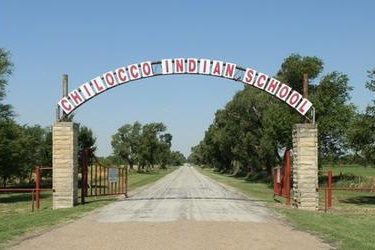Tribal Members Share Their Experience Living At Now Abandoned Native American Boarding School
Ch 9 - November 15, 2024 10:39 am

Chilocco Indian School located near Ponca City, Oklahoma.
As we celebrate Native American Heritage Month, News 9 took a look into one of the nation’s first off-reservation Native boarding schools. Chilocco Indian School in northern Oklahoma near the Kansas border closed four decades ago but remains a piece of state history. News 9 was given exclusive access to what remains of the campus.
A recent federal report shed new light on the dark history of forced Native American boarding schools in the United States, detailing decades of undocumented deaths and abuse. There were dozens of those schools operating in Oklahoma. However, graduates of one of the state’s largest had a much different outlook on their time.
Once known as the “Light on the Prairie,” Chilocco Indian School near Newkirk, Oklahoma, became one of the first non-reservation boarding schools in the late 1800s.
“Chilocco would be designated as the agricultural training center,” said Jim Baker, a Chilocco graduate.
Now an abandoned campus, hundreds of acres are left overgrown.
“The first feeling I get is sadness, especially when I see what I see,” said Baker.
Dilapidated buildings that once housed thousands of Native students.
“The first 150 students were Cheyenne and Arapaho, Apache, Kiowa, Wichita Tribes,” said Baker. “The Cherokees, Choctaws, and Chickasaws, they really didn’t make an entry into Chilocco until 1910.”
Jim Baker, a Choctaw tribal citizen, walked through the school’s entrance gates in the 1950s. Baker said he was not forced to the school, unlike the early years of Indian boarding schools. However, school officials maintained strict order.
“We received three meals a day. We received a good place to sleep. We were always under good shelter,” said Baker. “Always had a good program; at the same time, I was learning a vocation that I could use once I left here.”
Chilocco was a small town with a water tower, fire station, employee homes, and even a print shop.
“The students learned their printing there, and what they were actually printing were federal documents,” said Baker.
Like most communities, Chilocco had a cemetery.
“Never fails, I get very emotional,” said Baker. “It’s just tribal custom, I think.”
Baker and his wife Charmain, also a Chilocco graduate, maintain the sacred grounds.
“We do have approximately 125 graves here,” said Baker.
Only one grave has a headstone with a name. A 4-year-old girl, possibly the child of a Chilocco employee. A monument in the corner of the cemetery listed the names, tribes, ages, and years of death. The Bakers were unable to find records for some deaths in the late 1800s to early 1900s.
“No cause of death, and we have eight that have no names at all,” said Charmain Baker.
A dark time in boarding school history gave way to a new era.
“The Meriam Report was highly critical of the way Indian schools were operating,” said Baker. “It became a lot more humanistic, I believe, after the Meriam Report.”
Chilocco became home to young war heroes.
“We are proud to talk about the 11 veterans who came to Chilocco from the Navajo code talkers,” said Baker.
World War II and Korean War veterans.
“It was kind of the Golden Age of Chilocco because the war,” said Claudine King, a Chilocco graduate. “We had a lot of Indian veterans coming in from the war.”
Now, 91-year-old Claudine King has fond memories of her time at Chilocco.
“In my senior year there were about 1,200 students and there were 43 different tribes,” said King.
King received an education and met her husband. Fellow students became family.
“When you got used to it, then it was wonderful,” said Baker. “Because we were all Native and there was an understanding that we have.”
As the years passed fewer and fewer Native youth came to Chilocco. The federal government permanently closed its gates in 1980.
“How many broken promises have there been from the federal government to the Indian people?” said Baker. “This was one of those I think broken promises.”
What was once a flourishing campus became a distant memory.
“I cried when the school building fell because there’s so many memories there,” said Baker.
Memories of those who have come and gone, and those who never left, and who will take care of Chilocco after them.
“If I had a billion dollars, I would have bought the place and maybe restructured it,” said Baker. “Rebuilt it but it’s foregone now.”
Chilocco alumni hold yearly reunions on the campus. They honor war veterans and the students who never made it back home.



